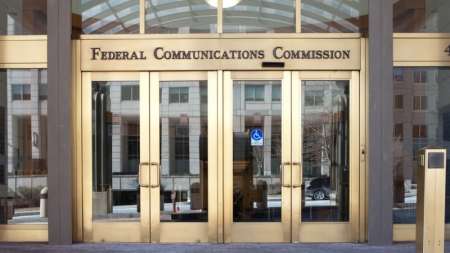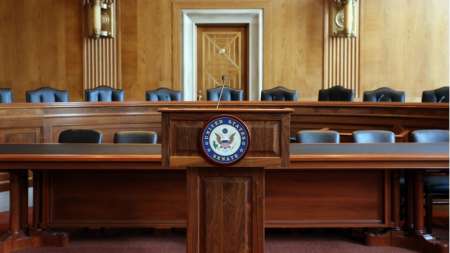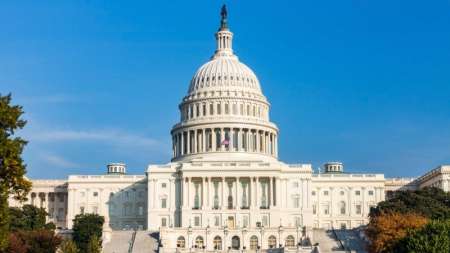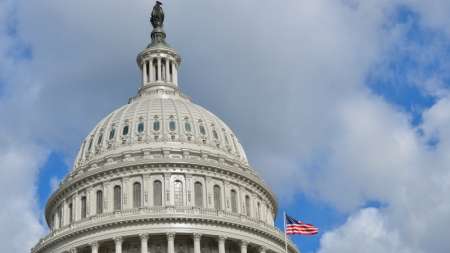Sen. Ron Wyden, D-Ore., requested information on how the Department of Justice (DoJ) is securing its offensive cyber tools in a June 5 letter to Attorney General William Barr. […]
Sens. Ron Wyden, D-Ore., and Rand Paul, R-Ky., introduced the Protecting Data at the Border Act on May 22. The legislation would ban the Federal government from conducting warrantless searches of Americans’ phones and laptops when crossing the U.S. border. […]
Earlier this week, Sens. Ron Wyden, D-Ore., and Maria Cantwell, D.-Wash., wrote to FCC Chairman Ajit Pai, urging the Federal Communications Commission (FCC) to not allow wireless companies to run in a 24 GHz band until weather forecasting is protected. […]
With Tax Day coming around the corner fast, some congressional Democrats and Republicans are leaning in support of private tax preparation companies by looking to permanently ban the Internal Revenue Service (IRS) from creating a free electronic filing system. […]
Bills introduced in the House and Senate yesterday would put a formal end to a National Security Agency program that has collected communications records metadata of U.S. citizens for intelligence and law enforcement use, following unconfirmed reports that NSA and the Trump administration are no longer interested in continuing the program. […]
A bipartisan bill introduced today in the Senate would support cybersecurity assistance to help senators and their staff members protect their personal devices from attackers. […]
Sens. Ron Wyden, D-Ore., and Tom Cotton, R-Ark., asked the Senate Sergeant at Arms in a March 13 letter to disclose to each member of the Senate “the extent of the cyber threats faced by the U.S. Senate–and by extension, our democracy,” and said disclosure of that information was “imperative in order to help the U.S. Senate address important cyber-security needs.” […]
Sens. Ron Wyden, D-Ore, Martin Heinrich, D-N.M., and Kamala Harris, D-Calif., wrote Dan Coats, director of National Intelligence, on Monday urging him to declassify information regarding China’s attempts to influence U.S. elections. […]
House Energy and Commerce Committee Chairman Frank Pallone, D-N.J., said Monday that Federal Communications Commission (FCC) Chairman Ajit Pai is refusing to give the committee an emergency briefing on wireless carrier data disclosure issues, and is citing the partial Federal government shutdown–which includes the FCC–for his decision. […]
Sens. Ron Wyden, D-Ore., Kamala Harris, D-Calif., and Mark Warner, D-Va., along with FCC Commissioner Jessica Rosenworcel voiced strong opposition Tuesday and Wednesday to the reported sale of user location data by telecom service providers including Sprint, T-Mobile, and AT&T. […]
Sen. Ron Wyden, D-Ore., is thanking the Senate Rules Committee for its work to improve the Senate’s cybersecurity posture by moving to begin encrypting data stored on Senate computers. […]
A bipartisan group of senators wrote to Secretary of State Mike Pompeo on Tuesday questioning the State Department on what they called its failure to meet Federal cybersecurity standards, including a “near total absence of multifactor authentication (MFA).” […]
Sen. Ron Wyden, D-Ore., asked Attorney General Jeff Sessions in an Aug. 21 letter to update the Justice Department’s (DoJ) guidance on use of cell-site simulator technologies–sometimes referred to as Stingray devices–to take into account information from a manufacturer that use of the devices may completely disrupt communications of targeted phones including emergency 911 calls and other features. […]
The Department of Defense is getting on board with some critical website and email protections that have been mandated across civilian Federal government agencies, even if it is lagging somewhat behind other departments in applying encryption and anti-phishing measures. […]
Language in the House FY 2019 Legislative Branch Appropriations Bill calls for the Congressional Research Service to study what scientific and technology policy resources are available to members of Congress. The bill, which sailed through the House Appropriations Committee on May 8, marks another step in reviving the long-shuttered Office of Technology Assessment (OTA). […]
A Senate bill introduced on Aug. 1 not only would establish security requirements for Internet of Things (IoT) devices purchased by the government, but also let researchers look for critical security flaws through vulnerability disclosure policies. […]
Sens. Dianne Feinstein, D-Calif., Sherrod Brown, D-Ohio, and Ron Wyden, D-Ore., sent a letter to White House Counsel Don McGahn asking for the Trump administration’s rationale in publishing the emails sent by many citizens to critique the President’s Advisory Commission on Election Integrity, many of which contained sensitive personal information. […]
Sens. John Thune, R-S.D., and Ron Wyden, D-Ore., sent a letter to President Donald Trump, urging him to make digital trade a priority in renegotiating the North American Free Trade Agreement. […]
The revelation that the National Security Agency conducted blanket surveillance of spectators at the 2002 Olympic Games could hurt the agency’s chances of getting its surveillance laws renewed this year. Thomas Drake, former NSA executive, submitted a formal declaration on May 25 that revealed the NSA’s program Stellar Wind, the goal of which was to “collect and store virtually all electronic communication going in or out” of the Salt Lake City area. […]
The National Security Agency announced last week that it will stop collecting Americans’ emails about foreign targets. However, this is a small amount of data compared to the rest of the information that the NSA collects. […]
Rep. Ted Lieu, D-Calif., and Sen. Ron Wyden, D-Ore., sent a letter to Federal Communications Commission Chairman Ajit Pai requesting that the agency take concrete steps to plug serious vulnerabilities in U.S. mobile phone networks. […]
Sen. Ron Wyden, D-Ore., said he plans to introduce legislation that would restrict law enforcement’s ability to search and demand passwords to the phones and online accounts of foreign travelers. […]
Catch up on some reading this weekend. Here are a few interesting items from MeriTalk. […]
An effort to block or delay changes to Rule 41 of the Federal Rules of Criminal Procedure failed to pass the Senate floor, causing the changes to the rule to go into effect on Dec. 1. The changes will allow law enforcement to obtain warrants to search computers in an unknown location and to search any device that the hacker has broken into, potentially granting access to multiple privately owned computers with one warrant. […]
A group of U.S. senators wrote a letter to Marissa Mayer, chief executive officer of Yahoo, on Tuesday about the hack on 500 million accounts in 2014. They ask what went wrong and how Yahoo plans to protect consumer data in the future. […]
Internal Revenue Service cybersecurity is woefully inadequate, and Congress is to blame, according to Sen. Ron Wyden, D-Ore. “Congress has sat back and watched while criminals have come in and preyed on taxpayers,” Wyden said at a Senate Finance Committee hearing. […]
























